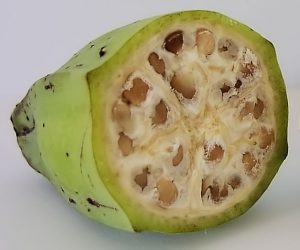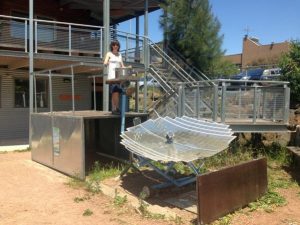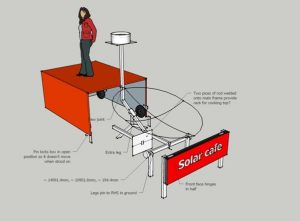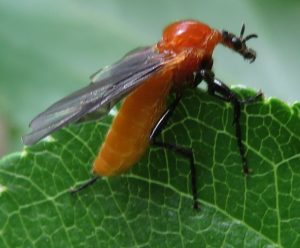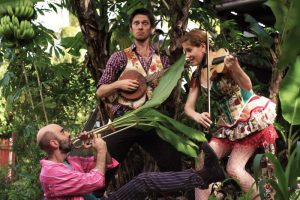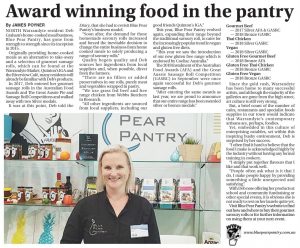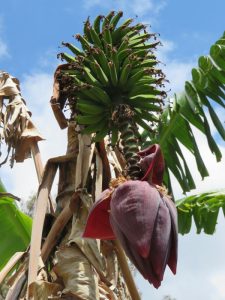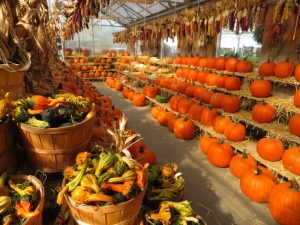Judy interviews Angelo Eliades
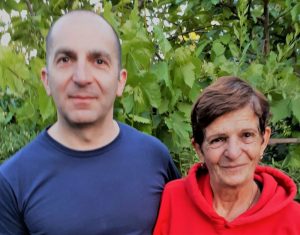 Angelo, who lives in Preston, is a well-known figure in the permaculture world. His website is Deep Green Permaculture. He works part time (including Saturdays) at Bulleen Art & Garden as a gardening expert, co-organises the Bulleen Veggie Swap and is the Science and Industry Research Officer at Sustainable Gardening Australia.
Angelo, who lives in Preston, is a well-known figure in the permaculture world. His website is Deep Green Permaculture. He works part time (including Saturdays) at Bulleen Art & Garden as a gardening expert, co-organises the Bulleen Veggie Swap and is the Science and Industry Research Officer at Sustainable Gardening Australia.
One of the first times that I met Angelo was when I visited his garden, where he was doing guided tours as part of the annual Darebin Backyard Harvest Festival. During the tour, he said something that I have never forgotten: “like all gardeners, I have to contend with lots of pests but the main pest in my garden is … [pause for effect] … my mum“! Well, Judy Vizzari has now interviewed both Angelo and his mum Savoula. As Judy says, Angelo’s garden is extraordinary, in large part due to how much he has managed to cram into a small space: “In this past year, I’ve seen quite a few gardens and been impressed in 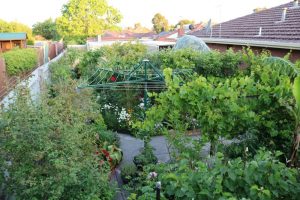 differing ways by all of them, but this is unlike any place I’ve visited. Before me is a narrow pathway lined with neat rows of water tanks and compost bins. Potted orchids’ bending spikes are loaded with exotic blooms and twisting grape vines bursting into leaf linger beneath the building’s eaves and dress its west wall. Beyond, I see the walkway opening onto a verdant mass dominated by greens, dotted with colour and defined by a myriad shapes within a huge variety of thriving plants. I see that many of the plants are food producers, others are medicinal herbs and others appear to be there to support their neighbours, perhaps to encourage beneficial insects, provide shade or just add to the aesthetics of the space. I’m impressed – I’ve never before seen such varied, thriving growth in such a small space.” Read the full interview.
differing ways by all of them, but this is unlike any place I’ve visited. Before me is a narrow pathway lined with neat rows of water tanks and compost bins. Potted orchids’ bending spikes are loaded with exotic blooms and twisting grape vines bursting into leaf linger beneath the building’s eaves and dress its west wall. Beyond, I see the walkway opening onto a verdant mass dominated by greens, dotted with colour and defined by a myriad shapes within a huge variety of thriving plants. I see that many of the plants are food producers, others are medicinal herbs and others appear to be there to support their neighbours, perhaps to encourage beneficial insects, provide shade or just add to the aesthetics of the space. I’m impressed – I’ve never before seen such varied, thriving growth in such a small space.” Read the full interview.
Robin’s veggie growing tip of the month – what is a compost activator?
A compost activator is a plant that activates and speeds up decomposition in the compost heap. It is the presence of potassium that makes a plant an activator. Potassium is found in sufficient quantity in the leaves of comfrey, yarrow, tansy, dandelion and stinging nettle and so you should put as much as you can of any of these in your compost layers. Comfrey also adds good quantities of trace elements which have been taken up by their very deep roots and deposited in the leaves, which then easily break down in the compost, releasing these trace minerals.
At this time of year, and during the hotter months to come, make sure that your compost is always moist throughout – decomposition will grind to a halt without moisture. Also at this time of year, there are plenty of fresh grass clippings available – add these clippings to speed up, and heat up, your heap, thereby killing any seeds that you have incorporated.
What seeds to plant in December
Here is a list (see the planting guide for more detail):
Warm season veggiesBeans |
Leafy greensLettuce |
PerennialAsparagus |
OtherBeetroot |
December is not a very good planting month: arguably too late for many summer veggies and, although you can plant leafy greens such as lettuce and mustard greens, they are likely to go to seed pretty quickly.
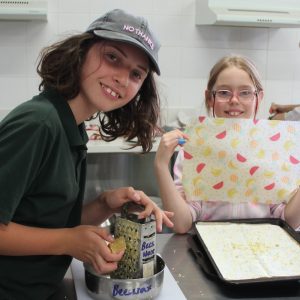 Montmorency Primary School will be a stallholder at the next Eltham Farmers’ Market
Montmorency Primary School will be a stallholder at the next Eltham Farmers’ Market
Students from Montmorency Primary School will be at the Community Market Stall at the next Eltham Farmers’ Market on Sunday, 2nd December. They will be selling strawberry jam, cordials, beeswax food wraps, lip balms and fruit/herbal teas (made by dehydrating fresh produce from the school garden).
The purpose of the Community Market Stall is to provide a free and legal venue for people to sell their surplus produce on an occasional basis. In other words, if you have too much surplus produce to swap at a food swap but not enough to sell through commercial channels, the Community Market Stall offers you an opportunity for selling fruit, vegetables or herbs which might otherwise be wasted, recouping some of your costs in keeping your garden going. If you are potentially interested in having a stall, contact me by either phone (0416 203067) or email.
‘Crowd harvest’ – seeds for Christmas
Gardeners with excess seeds are invited to send them in a Christmas card or holiday card to one of the not-for profit organisations listed below who will, in turn, either germinate the seeds, store them or distribute them to people facing crisis yet know how to start seeds. Please package the seeds in individual and labelled packages so that food relief recipients can easily take them home. The program runs from 1st December to 15th December. DIVRS in Preston, STREAT in Collingwood or Carrington Health at Level 2, 43 Carrington Road, Box Hill, 3128. Alternatively, Tiny Trowel, PO Box 4076, Box Hill South, 3128.
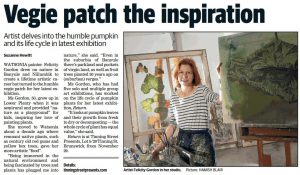 An exhibition of pumpkin paintings by Felicity Gordon
An exhibition of pumpkin paintings by Felicity Gordon
“A series of paintings … charts the beauty of pumpkin plants as they morph from a food source to seed depository.” Read the article in last week’s Leader (picture right). Thursdays to Sundays, 29th November to 16th December, 11am – 5pm. Tinning Street Presents, Lot 5/29, Tinning Street, Brunswick.
Is your soil safe? (cont)
Since last week, I have managed to talk to Kara Fry, from VegSafe. She has confirmed that the most appropriate standards to use when judging whether your soil is safe are the so-called ‘Australian NEPC Health-based investigation levels (Residential A) that we published last week. She also added: “The guidelines are not necessarily ‘safe’ levels; for example, when the NEPC set their guide of 300 mg/kg for lead (Pb), they also said that no level of lead is safe. Rather, the 300mg/kg mark is the level at which intervention is recommended.” Thanks for the chat, Kara.
Tamarillos in pots (cont)
Fay Loveland has written in: “I am growing a tamarillo in a pot. It’s a medium-sized pot and has a water well at the bottom. The plant was frost damaged in late August so it’s just coming back from that and starting to flower. I give the plant overflow water from a large wicking bed so that the tamarillo gets some leached nutrients. I sometimes give it liquid fertiliser too.” Thanks for the information, Fay.
More fun facts about bananas
In researching the little section above, I came across a web page entitled 23 ways not to waste. Most of the methods were general statements such as “cook every part of the vegetable” but one was very specific: “Make your banana bread out of bananas that are dark brown.”
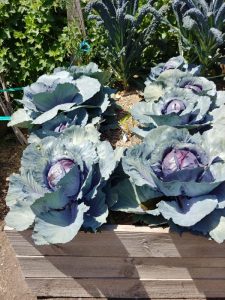 Why don’t my cabbages look like this?
Why don’t my cabbages look like this?
The picture was taken in a garden in Arthurs Creek a few weeks ago.
Interested in participating in the Darebin Backyard Harvest Festival?
Do you live in Darebin and are interested in opening your food garden or holding a food gardening workshop next year as part of the Darebin Backyard Harvest Festival to be held in May? They are looking for gardens of all sizes and cultural backgrounds. Gardeners will be supported to hold a 1-2 hour garden tour and visitor numbers are limited to a manageable size with bookings. Submit an expression of interest by end December. Alternatively, ring Lee Tozzi, Darebin Sustainable Food Officer, to discuss (8470 8392).
Which link was clicked most times in the last newsletter?
Katrina Forstner’s article on how to build a bee hotel.
Proverb of the month
As alike as two peas in a pod. Meaning: two identical items or people. This simile has a prosaic derivation: someone in the 16th Century simply decided that peas from the same pod are virtually indistinguishable and coined the simile. When the simile was first invented, ‘peas’ was actually spelt (and pronounced) ‘peases’ but, over time, people decided that that sounded naff and so the middle ‘se’ has gradually disappeared. It does, however, survive in the phrase ‘pease pudding’, which is a thick pea soup consumed in parts of North East England. But this usage might disappear as ‘pease pudding’ is becoming superseded by ‘mushy peas’. As I know from my gran’s cooking, mushy peas are often an oddly bright green colour but I’ve only just found out (whilst researching this article) that this was probably achieved by adding the yellow and blue additives, E102 and E133.
Interestingly, as different as chalk and cheese, meaning the opposite from as alike as two peas in a pod, also has a prosaic derivation: someone, this time in the 14th Century, simply thought it sounded good to use two short words that alliterated.
Gardening quote of the month
“Plant and your spouse plants with you; weed and you weed alone.” by Jean-Jacques Rousseau.
Joke of the week
What’s round, white and giggles? A tickled onion!
New events
Sylvester Hive presents Buzz & Dig – native bee workshop
What: This workshop will help you identify native bees and understand their nesting behaviour. Find out why insect biodiversity is so important and how you can encourage native bees to your garden. Take a plate to share.
When: Thursday, 29th November, 6-8.30pm.
Where: Sylvester Hive Community Garden, Preston.
Cost: free.
Bookings: EventBrite.
Further information: LFC calendar entry.
Stock Street Pop-up Garden art exhibition
What: Pop in and out of a garden art exhibition at the Stock St Pop-up Garden, which was built along the train line nearly 3 years ago and functions as a little fun community project for the people on the street. Artists are from the Moreland area and there is a variety of styles and themes to check out. Artworks will be for sale on the day. There will be finger foods and refreshments plus BYO alcohol.
When: Sunday, 2nd December, 11am-4pm.
Where: Stock Street Pop-up Garden, Coburg.
Cost: free.
Bookings: just turn up.
Further information: LFC calendar entry.
Introduction to mindful eating and yoga night
What: Join licensed Am I Hungry facilitator and dietitian (APD) Tess Gardiner for an introduction to mindful eating workshop. Learn how to develop the effective thoughts and positive feelings necessary to make decisions about eating, physical activity and self-care that support optimal health. This inside-out approach changes thoughts and feelings first so that changes in behaviour will last. The evening will begin with a 60-minute yoga practice with physiologist Jacynta Annesley (owner of Align Health & Movement) followed by a light dinner and then finishing with the 90-minute mindful eating workshop.
When: Monday, 10th December, 6.30-9.30pm.
Where: Heidelberg Heights.
Cost: $60 ($40 prior to 1st December).
Bookings: by phone (0402 702794).
Further information: LFC calendar entry.
Zero waste community lunch and food swap
What: Everyone is welcome to come along to this Sustainable Watsonia community gathering. Bring something to share without any single-use plastic.
When: Wednesday, 12th December, 12.30-2.30pm.
Where: Watsonia Neighbourhood House.
Cost: free.
Bookings: just turn up.
Further information: LFC calendar entry.
Summary of upcoming events
Over the next week
- Heidi garden club: Wednesday, 28th November, 10am-midday.
- Sylvester Hive presents Buzz & Dig – native bee workshop: Thursday, 29th November, 6-8.30pm.
- Festive inspired cooking master class: Thursday, 29th November, 7-9pm.
- Cook Indian by the creek: Friday, 30th November, 6.15-7.45pm.
- Festive inspired cooking master class: Friday, 30th November, 7-9pm.
- Summer fruit tree maintenance: Saturday, 1st December, 9.30am-12.30pm.
- Fruit tree pruning workshop with Chris England: Saturday, 1st December, 9.30am-12.30pm.
- Become a junior chocolatier: Saturday, 1st December, 10-10.45am.
- Backyard quails at The Plummery: Saturday, 1st December, 10-11.30am.
- Advanced composting workshop: Saturday, 1st December, 10am-midday.
- Miso paste making: Saturday, 1st December, 11am-1.30pm.
- Christmas gingerbread house demonstration: Saturday, 1st December, midday-1.30pm.
- Permaculture kitchen garden at The Plummery: Saturday, 1st December, 1-2.30pm.
- Beeswax food wraps: Saturday, 1st December, 2-4pm.
- Stock Street Pop-up Garden art exhibition: Sunday, 2nd December, 11am-4pm.
- Healthy lives plant-based cooking: Sunday, 2nd December, midday-4pm.
Over the next month
- Book launch – Tomato: Know, Sow, Grow, Feast: Thursday, 6th December, 6-8pm.
- Plant-based midweek cooking class: Thursday, 6th December, 6.30-8.30pm.
- Festive inspired cooking master class: Thursday, 6th December, 7-9pm.
- Cook Indian by the creek: Friday, 7th December, 6.15-8pm.
- Festive inspired cooking master class: Friday, 7th December, 7-9pm.
- Raw living whole foods with Valentina Rise: Saturday, 8th December, 10am-3pm.
- Bee hive tour: Saturday, 8th December, 10.30am-12.30pm.
- Green at Kathleen – natural pest control in the garden: Saturday, 8th December, 11.30am-1pm.
- Christmas cake decorating: Monday, 10th December, 10.30-11.30am.
- Introduction to mindful eating and yoga night: Monday, 10th December, 6.30-9.30pm.
- Gingerbread house demonstration: Tuesday, 11th December, 10.30am-12.30pm.
- Zero waste community lunch and food swap: Wednesday, 12th December, 12.30-2.30pm.
- Community Leaders in Sustainability Course information session: Thursday, 13th December, 6-8pm.
- Plant-based midweek cooking class: Thursday, 13th December, 6.30-8.30pm.
- Festive inspired cooking master class: Thursday, 13th December, 7-9pm.
- Cook Indian by the creek: Friday, 14th December, 6.15-7.45pm.
- Festive inspired cooking master class: Friday, 14th December, 7-9pm.
- Indigenous plants for food and medicine: Saturday, 15th December, 9.30am-12.30pm.
- Kombucha tea workshop: Saturday, 15th December, 10-11.30am.
- Formidable Veg Melbourne permie house concert: Tuesday, 18th December, 6-9pm.
- Diamond Creek Christmas lunch: Tuesday, 25th December, midday-3pm.




